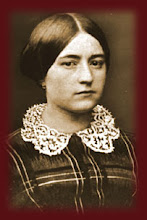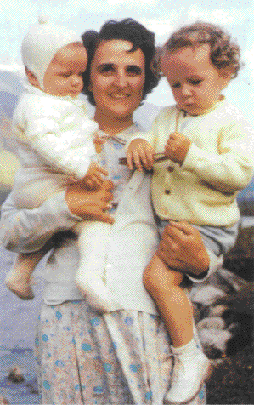(Trudy Ellen Craney, offloader of my karmic piano, as Madame Mao in Nixon in China. She enters during the ballet scene at 2:27.)
I was entirely grateful for what seemed like a gift from the fates. The piano had no overtones. When it went out of tune, the upper register would go sharp, and the lower register would go flat. Certain notes stuck, others didn't sound, and still others would reverberate on and on even if you weren't holding down the pedal. It had a crack in the soundboard. Nonetheless, it was a piano: a huge step up both in sound-making capacity and in prestige from the three-quarters-size keyboard that I'd had for years, and on which I'd learned all my repertoire. When we moved away from New York, the Ivers and Pond moved with us, over my husband's half-hearted objections. "It's a piano," I reminded him. In fact, the piano was my prize possession. By chance, a friend of mine from graduate school, an academic musicologist, was already living here in northern Appalachia, and was teaching a course in American minimalism -- the music of John Adams, Steve Reich, and Philip Glass -- at the local university. I told him that he should bring his students over to my house to see the piano upon which Trudy Ellen Craney had prepared the role of Madame Mao in Nixon in China.
The other day my piano tuner called. There was a piano in the area that he thought would be a good piano for me. It was a Kimball console in mint condition. I should go and take a look at it.
I should note here that, while in New York City a cheap piano can't be gotten for love or money, northern Appalachia abounds in them. People are always getting rid of pianos here. I suppose it's because people die, people move, people go into assisted living; this is the kind of place that has an aging population, because young people with talent and ability leave here for places that have jobs. Pianos are a casualty of this migration, and also of the gradual movement away from the practice of making actual music on real instruments, so small pianos seem to be widely available in this area at prices that would be considered shocking in New York.
I went to look at the piano. It was a lovely little console, about the size of my karmic Ivers and Pond, but in much better condition, with a nice solid action. Evidently it had been rarely played. Kimball was at one time the biggest piano manufacturer in the world; there were Kimballs in many of my elementary-school music classrooms, as well as in the practice rooms I haunted as an undergraduate, but those markets are dominated now by Japanese makers. The Kimball's owner, a former band instructor, was in assisted living, and his brother was sorting out his possessions. The brother was a kind man, well into his eighties himself. His father, unbelievably, had been born in 1868, and had been an engineer on the Lehigh Valley Railroad. We had a lovely chat, I played the Kimball and sang a little, and he gave me the piano for free.
The new, free piano was moved in the other day, and my old Ivers and Pond moved out. The mover was a gruff man, who said in an accusatory way, "I don't know why you're getting a Kimball. You can't get rid of them. They're crap." I blanched for a moment, but I said goodbye to my old karmic piano, the instrument on which a great artist had learned a role that she created in a great and groundbreaking work of art. I imagine that Trudy Ellen Craney had brought the Ivers and Pond from her childhood home in New Jersey to her loft in SoHo; it was that kind of piano, a family piano. Our old voice teacher, who lived in Washington, D.C., used to give lessons at Trudy's loft when she was in town, so, besides being a tool in the furtherance of a great work of art, that piano had accompanied a lot of other great singing besides (I do not mean my own; our teacher had some really fantastic students). I had had the Ivers and Pond for fifteen years, and it had taken me through a new stage in my career -- when I transitioned out of opera and into the concert performances that grew out of my archival research into rare repertoires -- and into new stages in my life as a graduate student, wife, and mother. My older son had recently begun playing it.
I wanted to sing "Vecchia zimarra" to it, but there wasn't time. I wonder where it will go; to a church basement or a VFW hall, perhaps. And no one will ever know the part it played in the creation of a great opera, nor in the hidden joys and sorrows of the lives of a few struggling artists.












